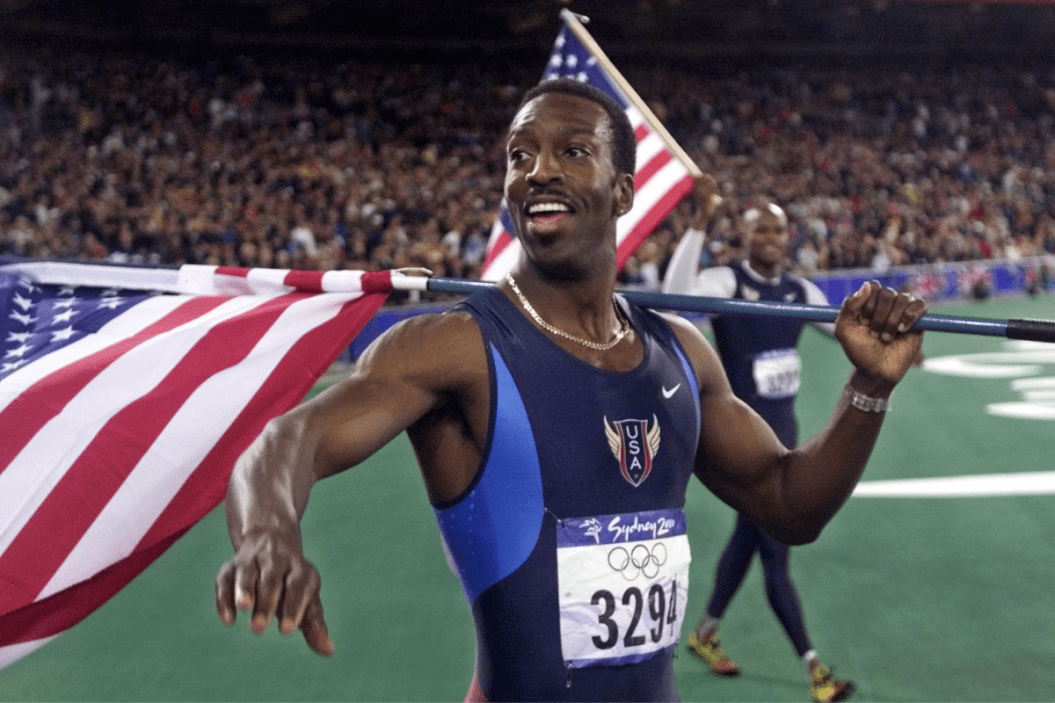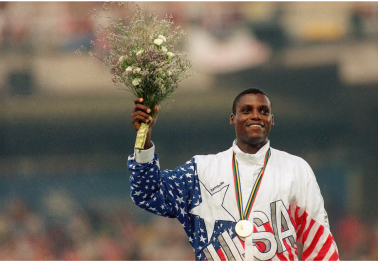Olympic and American hero Michael Johnson set a world record in the 200-meter race during the thrilling 1996 Atlanta Olympics. But when "The World's Fastest Man" attempted a 200-meter track in 2019, it took him 15 minutes to walk the same distance.
How did we get here?
The athlete introduced himself to the world as an Olympic sprinter in the 1992 Barcelona Olympics. After a surprise loss in Catalonia, he turned disappointment into speed and won gold at the 1996 Atlanta Olympics. After one more Olympic lap in Sydney, Michael Johnson retired from the track. Johnson has stayed plenty active since.
Then, one day in 2018, his busy life came to a screeching halt.
How did Michael Johnson get to this moment, and how is he doing now?
Michael Johnson's Upbringing
Michael Duane Johnson was born the youngest of five in a Dallas, Texas, household. He jokes his low status on the totem pole is why he can run so fast. He is probably at least half-right.
All of his older siblings went to college, setting a standard for young Michael. His legs lead him to the track team at Baylor University.
Johnson won the NCAA 200-meter Indoor Championship in 1990 during his last year with the Baylor Bears. He went pro the following season.
By 1991, his move bore fruit: Michael Johnson won the 200-m at the World Championships in Tokyo. Heading into 1992, his reputation for the World Championship Gold was growing. Nothing could possibly slow him down, except for moldy meat.
The Ham in Spain
Jamon? More like Jam-off, if you ask Michael Johnson. (I can see myself out, thank you.)
The Olympics landed in Barcelona, Spain in 1992. Johnson arrived in Barca with his agent, ready to loot the expected gold. As the story goes, Johnson enjoyed some of the local fare but paid much more than the menu price.
An apparent aberrant slice of ham screwed his first Olympics.
Johnson got food poisoning in Barcelona. The tainted meat wrecked his body, toilet, and chances for individual gold. He went to the Barcelona Games favored for gold in the 200-m. By the time a physically depleted Johnson finished the race, he found himself in sixth place.
Extremely disappointed, he took his frustrations out in the 4x400-meter race, winning gold with Team USA.
That is how good Michael Johnson was: he gets his first Olympic gold medal and walks away disappointed. Johnson vowed to come back even faster the next Olympics and never eat meat again. Just kidding about the vegetarianism, but not about the revenge tour.
The World's Fastest Man
Michael Johnson, if anything, is a man of his word. After his Spanish disappointment, he came back faster than ever. No, really. Than ever. Johnson started lining up records and striking them down like bowling pins; shout out to Pete Weber.
The first record? Well, more of a feat than a record. No professional male athlete had ever won the 200-m and 400-m sprint during the same major competition. Johnson did so at the 1995 World Championships. Nobody asked him to, but Johnson went ahead and triple-crowned the event, becoming the only man to win the 200-m, 400-m, and 4x400 relay at the same championships.
Feats like that are why we love Michael Johnson — he wins races nobody is supposed to be able to win, and then some.
The Olympic Committee loved Johnson, too, though maybe more than an unbiased committee should. Surfing his own hype wave from the World Championships, Johnson asked the Olympic Committee to re-arrange the 1996 Atlanta Olympics track & field schedule to allow his attempt at winning the triple again in the ATL.
The committee obliged because who doesn't like witnessing history? Even Johnson's fellow racers (the people sprinting for second place) couldn't help but gush over how cool Michael Johnson is. The only person who disliked Michael Johnson was one of our northern neighbors.
Donovan Bailey was a Canadian sprinter. Well, he was the Canadian sprinter in the 1996 Olympics, slated to win the 100-meter sprint. Typically, the winner of that race wins the title of "The World's Fastest Man." That was all well and good until Johnson came along and sportswriters began referring to the 200-m champion as The Fastest.
The thing about the fastest, though, is that there can only be one. The debate remains unsettled, so let's deal with facts.
Give Donovan Bailey his due. Fact: he won two gold medals at the 1996 Atlanta Olympics. Good for him, Go Canada, ya-di-ya-di-ya. Now to the truth: Michael Johnson proved he was the fastest man alive in 1996.
Donning Gold cleats, the expectations of which would slow any other athlete down, Johnson took no prisoners in Atlanta 1996. "The Man with the Golden Cleats" won the 400-meter race with ease, nearly a full second ahead of second place.
A few days later, he won the 200-meter race with ease. The only other racer who even came close to his time was Johnson himself -0 with a time of 19.32 seconds, Johnson shattered the 200-m world record that he had just set one month before the Olympics.
His Olympic record 19.32 stood for 12 years before Usain Bolt dashed it in 2008.
Michael Johnson left the Olympiad feeling like King Midas, later crowned Amateur Athlete of the Year. Just another reason the 1996 Atlanta Olympics were the bomb.
Disappointment Down Under
RELATED: Vince Carter's "Dunk of Death" Over a 7-Footer Became Olympic Glory
Michael Johnson's track and field career didn't end in 1996, though he never reached the same Olympic heights.
Remember Donovan Bailey? Well, that Moose-loving gold medalist didn't take kindly to his American neighbor's claim to The Fastest, so the two sprinters agreed to a 150-meter race in 1997.
The race was a veritable carnival, which was great for the sport of racing. For sprinters, if anyone is paying attention during a non-Olympic year, that's a big deal.
The race between Johnson and Bailey turned out to be no big deal at all. Johnson pulled his hamstring, Bailey called him a faker, and both men made over $500,000 for running less than two football fields. People moved on, but Johnson's nagging hamstring stuck around.
In Y2K, Johnson caught beef poisoning once again. No Spanish ham this time, however. Johnson was beefing with Team USA compadre Maurice Green. Green had unseated Bailey for "World's Fastest Man" by winning the 100-m. Green was now coming for Johnson in the 200-m.
During the lead-up to their race, the two super athletes enjoyed a war of words in the media. Just like the Bailey beef, Green versus Johnson was fantastic for running.
Johnson's faulty hamstring, however, was not fantastic for running. Johnson v. Green scheduled a head-to-head at the 2000 Sydney Olympic trials. Just like in the race against Bailey, Johnson's hamstring pulled him up once again. Unlike Bailey, Green also suffered an injury that prevented him from finishing the race.
Neither competitor qualified for the Sydney Olympics 200-meter race. And just like that: the world record holder was out, never to return.
Johnson still went to the 2000 Olympics and won a gold medal; he's just that good. His hamstring recovered in time to win the 400-m individual race. It was the last gold medal Johnson won, not including the one to be stripped from him.
By no fault of Johnson's, the 4x400-m Team USA Gold medal-winning relay team had their accomplishments rescinded in 2009 when team member Jerome Young admitted to performance-enhancing drug use. It is an unfortunate footnote on Michael Johnson's four-time Gold Olympic career.
Four years after the 2000 Sydney Olympics, the US Track and Field Hall of Fame inducted Michael Johnson to their hall.
Michael Johnson Now
Olympic sprinters have short but sweet careers. Nothing about what they do is meant to last long. That's why they're sprinters. That's why we love them.
Michael Johnson has been spreading the love in the form of athletics know-how at Michael Johnson Performance (MJP) in Dallas, Texas, Johnson's hometown.
There, Johnson offers his expertise to amateur and professional athletes alike, working with Nike to improve physical performance. As it turns out, it takes more than just Golden Cleats to run fast.
MJP takes Johnson on regular trips to Great Britain to train squads for English Premier League giants such as Arsenal and Manchester United. But Johnson doesn't limit his athletic expertise to the field.
He participated in America's Cup in 2013, a yacht race around the San Francisco Bay. His participation led to this amusing moment, accompanied by a clever call from the announcer.
Johnson is compared to Olympic Champion Carl Lewis and was heavily involved in the Los Angeles bid for the 2028 Olympic Games. So how did Johnson go from a 20-second 200-meter to a near 20-minute time?
The former Olympian suffered a stroke in 2018. While working out at his home in California, Johnson experienced confusion, dizziness, and numbness in his left side. Johnson's wife brought him to the emergency room, where his condition worsened.
By the time he went from the ER to an MRI, he couldn't walk. It's a scary health situation for Michael Johnson and anyone, really. If someone in such supreme condition as Johnson isn't immune to strokes, then who is? That's part of the awareness Johnson spreads today.
Johnson's back on his feet and has fully regained control of his faculties. He's a Stroke Education Ambassador for the American Stroke Association, using his celebrity as a platform to raise awareness for heart and brain health.
Ironically, recognizing stroke symptoms can be summed up in an acronym Johnson knows better than anyone: F.A.S.T.
- F- Face drooping
- A-Arm weakness
- S- Speech difficulty
- T- Time to call 911
Michael Johnson is an American hero and stroke survivor who has given a whole new meaning to The World's Fastest Man.

